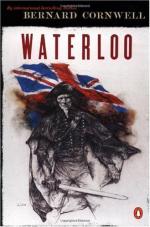
|
| Name: _________________________ | Period: ___________________ |
This test consists of 5 short answer questions, 10 short essay questions, and 1 (of 3) essay topics.
Short Answer Questions
1. Who captures the 69th battalion's colours?
2. What does Napoleon do in the East?
3. Who is Lord John Rossendale?
4. What does Jane discover?
5. What happens when Halkett obeys the Prince of Orange's orders?
Short Essay Questions
1. What are some of the types of infantry attack used in the battle for Quatre Bras?
2. How do the French feel about the outcome of the war and why haven't the Prussians come to help the British?
3. What town on the river Sambre is easily taken by the French, who tries to stop them, and what does this mean in tactical terms?
4. Why is the Duchess of Richmond apprehensive about John Rossendale?
5. What type of technical details are seen in Chapter 8?
6. What is used on the field of battle besides weapons and men and why?
7. Who does Sharpe encounter while escaping the crossroad area and what happens?
8. Why are the French able to cross into Belgium and what type of resistance is there?
9. To whom does Sharpe send a note when he encounters men from the German Legion and what is the response? Why does he respond that way?
10. Why are the Dutch-Belgium troops unable to fight well?
Essay Topics
Write an essay for ONE of the following topics:
Essay Topic 1
In Chapter 11, the macabre auction of the personal possessions of the dead officers is another example of the brutally simple disposition of the fallen soldiers' belongings and also their corpses. Only the most privileged soldiers and officers will have the benefit of loved ones and servants to seek them out from the vast field of dead and dying when the battle is over.
1. Do you think the treatment of dead soldiers and their possessions in this era meant that people had little value to society as a whole back then? Why or why not?
2. In terms of manpower does it seem to be short-sighted of the ruling class to pay so little attention to the wounded on the battle field? In other words, how many men may have died who could have survived to continue serving in the military? Why or why not would you consider the ruling class short-sighted in regards to wounded men?
3. Compare and discuss the difference in the way wounded are treated in war today as compared to that era.
Essay Topic 2
Sharpe, despite his background, is an officer and a gentleman and is, therefore, accorded more respect and trust, even in enemy territory, than the common soldier. Discuss the following:
1. Does it seem likely that officers are usually more respectable than enlisted men back then? What about today? Why or why not.
2. Sharpe refuses his wife a divorce and yet maintains a mistress. Do you think this is how an officer and gentleman comports himself? Why or why not.
3. In the present military in the United States, both officers and enlisted can be held for court martial for adultery or having sexual relations with someone of inferior rank. Why do you think this is so? Do you agree with the policy?
Essay Topic 3
D'Alembord's premonition that he will be killed and his developing fear of tomorrow's events exemplifies the true nature of courage, which includes coming to terms with fear and overcoming it.
1. Discuss in detail whether courage is the absence of fear or doing a task in spite of it. Use examples to support your answer.
2. If a person runs from a battle due to fear, do you think that means he will always run from a battle? Why or why not? Use examples to support your answer.
3. If a person goes into combat with no fear and kills a significant number of the enemy and perhaps rescues other soldiers, is that person courageous? In other words, if a person acts like a hero/ine, yet truly has no fear, does that person still qualify as having courage? Why or why not?
|
This section contains 1,210 words (approx. 5 pages at 300 words per page) |

|




